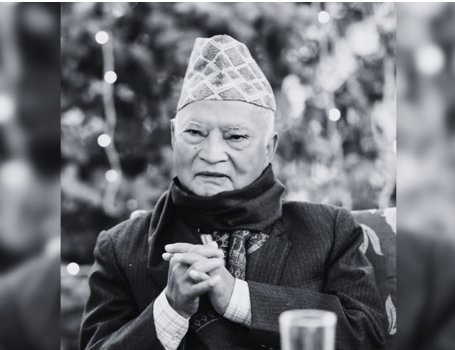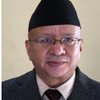
We are shocked by the untimely death of MohanmanSainju, former Vice Chairman of the Planning Commission and realize that this is an irreparable loss to the country. Being the president of the “BalSakhaMandal” in Tansen as a child and opening a library and was a keen genius since childhood, Mohan's sincere appreciation was a moral boost for the young lad which enabled him to gather like-minded youth at the age of 13 and start a club called “BalSakhaMandal”.
Although it was a childhood club, it helped to inculcate the values of abstinence from gambling, alcohol and smoking and to keep good company for a good way of life. They also had an understanding with the local police for their support and assistance where abusive adults threatened them by whistling in a bizarre manner.
The club also conducted adult classes in the evenings for those who did not have the opportunity of early education. Mohan also had close encounters with poet Lakshmi Prasad Devkota and freedom fighter Khadgaman Singh, and his contemporaries say that these childhood experiences helped him to aspire to more.
Born in Saiju family of PalpaTansen'sBhagwatiTole, he achieved many works and fame both personally and nationally "Without constant growth and progress, words like improvement, achievement and success have no meaning. -Benjamin Franklin" He believed in this sayings. He hastwo children of his own one a son and a daughter. We express our deepest condolences for the bereavement to his wife Madhuri, son Manish and daughter Mita.
Looking at a cursory summary, he was selected for three scholarships at the London School of Economics, the University of Manchester and the Fulbright in the United States. During this period, the government was reviewing the first five-year plan and Mohan actively participated in the program and the then Planning Secretary Dr. BheshBahadurThapa noticed. Thapain the government had an important project in mind and were inspired and encouraged to join the government service. Mohan was watched by those who returned to Nepal without completing his PhD to help his nation's development.
Mohan turned down the opportunity to go abroad for higher education and started working in the government.
In 1963, he entered the first pilot project that started using the land reform program in Nepal. He was appointed as a special officer. He started an experimental program in 3 districts of Nepal namely Jhapa in the Terai, Palpa in the mid-hills and Chitwan in the inner Terai.
Mohan was expected to come up with a proposal to use in the process of land reform implementation and suggest to policy makers what kind of land reform is appropriate in Nepal and what land reform is needed to address the problem of land and landlessness in Nepal.
He has published many works on Nepal's development administration, planning, decentralization, diplomacy, etc. in Nepal and foreign communication media and he has also published the book "From Budhabareto Chakupat".
After a year of experimentation, Mohan succeeded in submitting a proposal to the government, which was enthusiastically accepted, and land reform was implemented in 1964 for the first time in Nepal's history. It was an important project because almost all political parties talked about it from 2051 but never saw the light of day because the mechanism was never envisaged.
Thus, in 1964, the Department of Land Reforms was established and the program was implemented. Mohan was given the opportunity to become the first Director of Land Reforms and at the age of 23 was the youngest at the central level.
Land reform was not popular among the army, palace or high-ranking officials of the Singh Darbar, the elite and the program was becoming ineffective in its implementation.
Most of the landlords were somehow against it and when they could not remove Mohan from the job, they gave him some obstruction in the jagir.
After some time, the government took action against the civil servants and 17 employees were fired. They were given the opportunity to retire from service and Mohan was in the group in 1968 along with PashupatiShamsherRana.
The timing was perfect to fulfill Mohan's desire to study and thus he again applied for the Fulbright scholarship. There was no problem as Mohan was already selected despite having no prior work experience.
Now with accumulated rich experience there was no problem in selecting him and approval was given immediately.
And in 1969, Mohan went to the United States for his doctoral program. Mohan graduated from the University of North Carolina at Chapel Hill in 1972. His major was in development and he also completed a minor in international relations.
Dr. Sainju returned to Kathmandu and started working at the Center for Economic Development and Administration (CEDA) where PashupatiShamsherRana was the executive director and who was also at the stage of his dissertation after his expertise.
Dr. Sainju was appointed Chief Expert at CEDA. Later in 1973 Dr. Tribhuvan University rector.Sainju was appointed.
He was a good and effective speaker or a good orator . Even in the movement of 2036BS , he had the ability to convince people.
Perhaps it was because he had to look at the whole of Nepal, the work he did was not something to be done only for Palpa and Tansen. He was “TansenGuthi”'s advisor during late in his life.
With his untimely death, Nepal feels that it has lost a gem of a skillful planner, economist, diplomat and resident of Palpa.
He hold important positions like: Land reform during Birendra's reign, Rector of TribuvanUniversity, long time member of Planning Commission, then Vice Chairman, Ambassador to America, President of Poverty Alleviation Fund.As the president of IIDS, he fulfilled his intensive responsibilities successfully. I could hear Birendra visiting the development area in the review meeting and before the king, asking concerned authorities about the progress of a certain issue in the last time.
Our family, especially my father Dasharath Man Singh and mother Mithila Devi, had a very close and religious relationship with his brother Dwarikadai and Bhauju, and he used to call my father “Mama”.
As long as his brother was alive, it was customary to celebrate Dashain one year in Palpa and one year in Kathmandu.He was the chief guest at JanataVidyalaya's Silver Jubilee. He was a brilliant student of the same. Later, when we were studying in Tribhuvan College, he also addressed the "Planning Cell" about the importance of planning and the goals, policies, working policy and programs adopted by the plan.I remember addressing us .
In the year 1987, I remember that he wrote the preface in the book written by me on "SAARC: From Dhaka to Kathmandu" published during the inauguration of the SAARC Secretariat and at that time he was a member of the Planning Commission. The untimely death of a person like Saiju, who has done exemplary work in terms of profession, cannot complete the incomparable contribution made by him, be it in the economic field, in education or in diplomacy, and in the social field.
Nepal has lost a skilled personality and a rich thinker. In this sad time, we express our heartfelt condolences to his family and pray that ShriPashupatiNath gives them the strength to bear the grief.
- Susan's “U-Turn” From Atheism To Spirituality And Superstition: Some Considerations
- Jun 29, 2025
- Former Ambassador To People’s Republic Of China Acharya's 'Diplomatic Diary': A Collection Of "Autobiography " Including Diplomacy
- Jun 17, 2025
- Banker And Businessman Being The Same Person: How Practical, How Impractical
- Jun 01, 2025
- 2082/83 Policy And Program: Presentation New, Short But Not Exciting
- May 07, 2025
- Nepal's Capital Market: Some Analysis
- May 02, 2025













